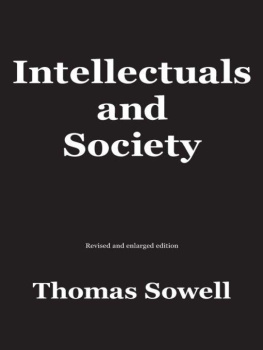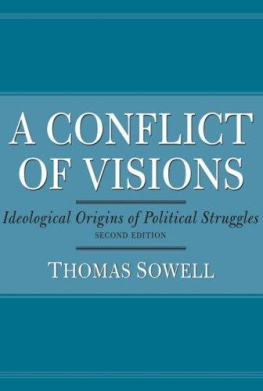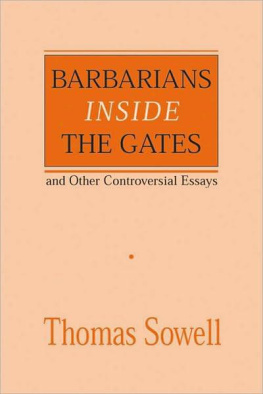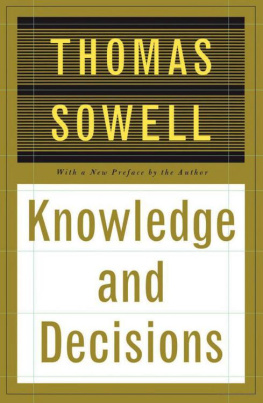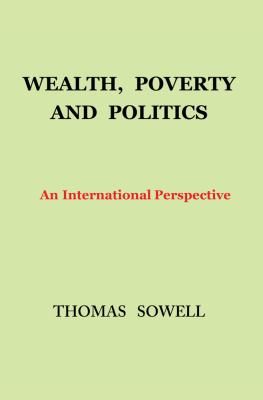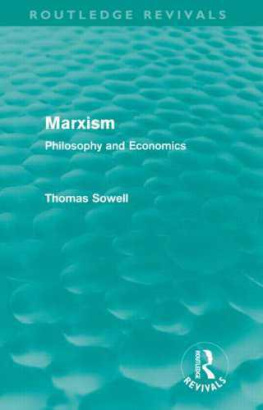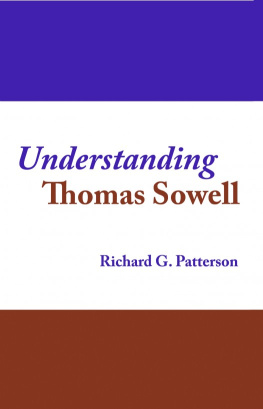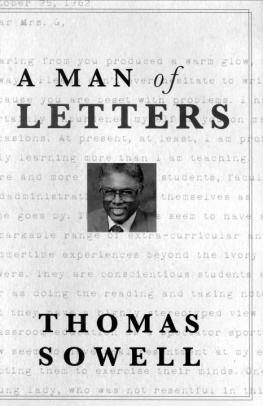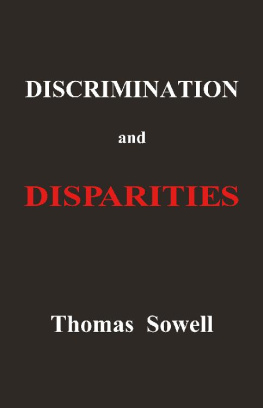Table of Contents
PREFACE
T his extensively revised and greatly enlarged edition of Intellectuals and Society contains not only four new chapters on intellectuals and race but also additions, revisions and reorganizations of other chapters. The new material includes a critique of John Rawls conception of justice and a re-examination of what has been called the trickle-down theory behind tax cuts for the rich. Yet the basic themes and structure of this book remain, and are strengthened by the new material and its implications. This will become especially apparent in the much revised final section, summarizing the main themes of the book.
There has probably never been an era in history when intellectuals have played a larger role in society than the era in which we live. When those who generate ideas, the intellectuals proper, are surrounded by a wide penumbra of those who disseminate those ideaswhether as journalists, teachers, staffers to legislators or clerks to judges, and other members of the intelligentsiatheir influence on the course of social evolution can be considerable, or even crucial. That influence has of course depended on the surrounding circumstances, including how free intellectuals have been to propagate their own ideas, rather than being instruments of state propaganda, as in totalitarian countries.
There would of course be little point in studying the ideas expressed by prominent writers like Ilya Ehrenburg during the era of the Soviet Union, for these were simply the ideas permitted or advocated by the Soviet dictatorship. In short, the study of the influence of intellectuals is here a study of their influence where they have been freest to exert that influence, namely in modern democratic nations.
For very different reasons, this study of patterns among intellectuals will pay less attention to such an intellectual giant as Milton Friedman as to any number of intellectuals of lesser eminence, simply because Professor Friedman was in many ways very atypical of the intellectuals of his time, both in his scholarly work that won him a Nobel Prize and in his work as a popular commentator on issues of the day. A balanced general intellectual history of our times would have to give Professor Friedman a far larger amount of attention than a study which focuses on general patterns , to which he was an outstanding exception. Aleksandr Solzhenitsyn was another landmark figure in the intellectual, moral and political history of his age who was likewise too atypical of contemporary intellectuals to be included in a study of the general patterns of the profession.
Because this is a study of patterns , it is not confined to contemporary intellectuals but includes patterns that have, in many cases, existed among the intelligentsia for at least two centuries. Because it is a study of general patterns, it does not attempt to account for every sparrows fall. Nor is it simply a series of critiques of particular intellectuals or particular issues, though one cannot critique a pattern of thinking without examining concrete examples of that thinking.
In this context, the purpose of discussing the Iraq wars or the war in Vietnam, for example, is not to determine the wisdom or unwisdom of Americans becoming involved in those wars, but to understand the role of intellectuals in relation to those wars. Similarly, the purpose of discussing The Bell Curve is not to determine the merits or demerits of The Bell Curve itselfsomething I have written about elsewherebut to show the implications of the intellectuals contentions regarding that book, neither of whose authors has been sufficiently typical of the patterns found among intellectuals to make The Bell Curve itself the main focus.
Many books have been written about intellectuals. Some take in-depth looks at particular prominent figures, Paul Johnsons Intellectuals being an especially incisive example. Other books on intellectuals seek general patterns, Ideology and the Ideologists by Lewis S. Feuer being a very thoughtful and insightful example of this approach. Richard A. Posners Public Intellectuals is about those intellectuals who directly address the public, while the focus in Intellectuals and Society is on intellectuals who influencesometimes shapepublic attitudes and beliefs, whether or not they are widely read by the population at large. As J.A. Schumpeter said, there are many Keynesians and Marxians who have never read a line of Keynes or Marx. They have gotten their ideas second- or third-hand from the intelligentsia. Many school teachers may not have read anything by John Dewey, and yet their whole approach to education may reflect a vision and an agenda formulated a century ago by Dewey, and permeating schools of education today.
Among the many things said by those who have studied intellectuals, a comment by Professor Mark Lilla of Columbia University in his book The Reckless Mind is especially striking:
Distinguished professors, gifted poets, and influential journalists summoned their talents to convince all who would listen that modern tyrants were liberators and that their unconscionable crimes were noble, when seen in the proper perspective. Whoever takes it upon himself to write an honest intellectual history of twentieth-century Europe will need a strong stomach.
But he will need something more. He will need to overcome his disgust long enough to ponder the roots of this strange and puzzling phenomenon.
While Intellectuals and Society is not an intellectual history of twentieth-century Europethat would be a much larger project for someone much youngerit does attempt to unravel some of the puzzling phenomena in the world of the intellectuals, as that world impacts society at large. Rather than simply generalizing from the writings or behavior of particular intellectuals, this book will analyze both the vision and the incentives and constraints behind the general patterns found among members of the intelligentsia, past and present, as well as what they have said and its impact on the societies in which they said it.
Although we already know much about the biographies or ideologies of particular prominent intellectuals, systematic analyses of the nature and role of intellectuals as a group in society are much less common. This book seeks to develop such an analysis and to explore its implications for the direction in which the intelligentsia are taking our society and Western civilization in general.
Although this book is about intellectuals, it is not written for intellectuals. Its purpose is to achieve an understanding of an important social phenomenon and to share that understanding with those who wish to share it, in whatever walk of life they might be. Those among the intelligentsia who are looking for points to score or things at which to take umbrage will be left to their own devices. This book is written for those readers who are willing to join with me in a search for some understanding of a distinct segment of the population whose activities can have, and have had, momentous implications for nations and civilizations.
While some studies of intellectual history, and especially studies of ideological differences, seek to explain conflicting social visions by differing value premises among those on opposing sides of various issues, Intellectuals and Society seeks instead to explain ideological differences by differing underlying assumptions about the facts of life, the nature of human beings and the nature and distribution of knowledge.
Ideological differences based on differing value premises are ultimately differing tastes, on which there is said to be no disputing. But differences based on beliefs about facts, causation, human nature, and the character and distribution of knowledge, are ultimately questions about different perceptions of the real world, leading to hypotheses which can be tested empirically.


